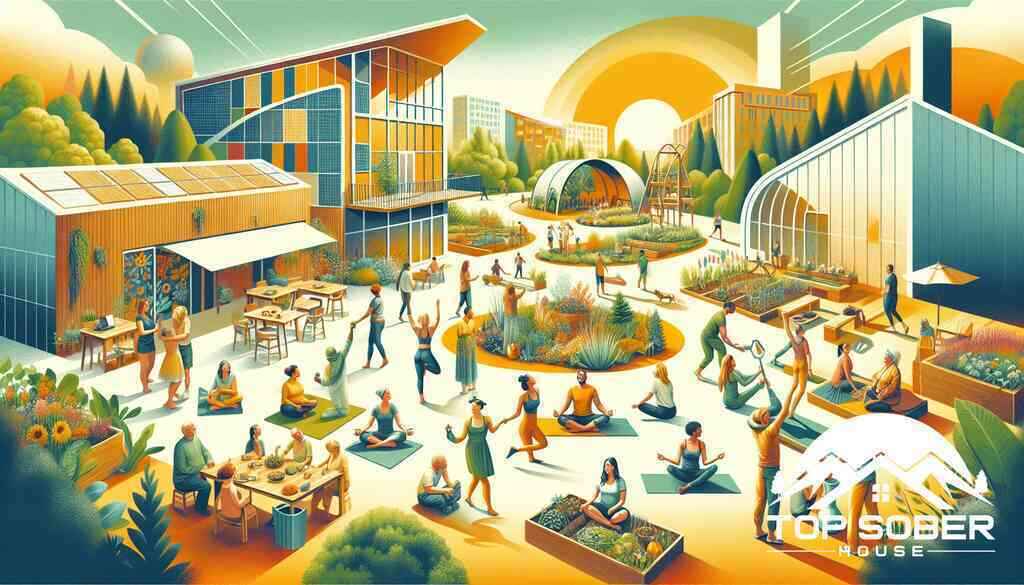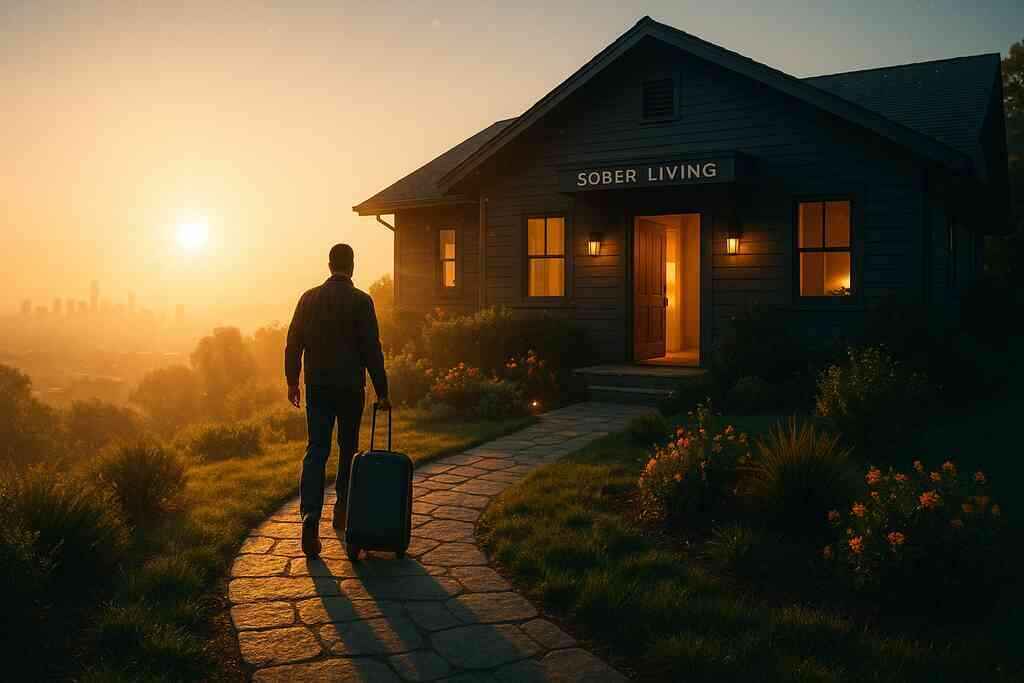
What are the Top Sober House Trends in Georgia?
September 29, 2025
Illuminating the Path to Recovery in Georgia
Unveiling Georgia’s New Era of Sober Living
Georgia is at the forefront of transforming recovery landscapes, embracing innovative approaches to addiction recovery. As 2023 unfolds, new Top Sober House Trends in Georgia highlight a commitment to modernizing sober living environments. From luxury sober living options to greater focus on holistic wellness and community support, Georgia is leading a quiet revolution. These developments showcase an evolving dedication to sustainability, technology integration, and personalized support systems that cater to the diverse needs of individuals in recovery, offering a fresh start within warm and supportive settings.
In this evolving milieu, there is also a noticeable shift towards integrating community-focused initiatives with substantial investments in peer mentorship and family involvement. Georgia’s sober houses are no longer just temporary shelters but are evolving into comprehensive rehabilitation environments offering stability and growth avenues. With sustainable practices and modern amenities, these homes are designed to ensure comfort and encourage a conducive recovery environment. This not only supports individuals in conquering alcohol and substance use disorders but also enriches their journey to sustained sobriety with access to tailored recovery plans that resonate with personal experiences.
Understanding Georgia’s Evolving Sober House Landscape
Georgia’s sober house landscape is evolving, reflecting societal shifts and embracing more inclusive and diverse recovery paths. The burgeoning trend of digital support tools offers unprecedented assistance, further driving this evolution. Tools like virtual meetings and mobile applications are becoming an integral part of Digital Support for Sober Living strategies, complementing traditional approaches like 12-step programs and group therapy. In essence, the landscape now balances innovation with time-honored recovery methodologies, fostering an environment where individuals feel empowered to manage their recovery journey actively.
In addition to embracing digital advancements, Georgia’s sober houses are redefining conventional norms by establishing eco-friendly living habitats. Such establishments not only emphasize recovery but also nurture an eco-conscious lifestyle. Integrating sustainable practices into daily routines, these homes focus on reducing environmental impact by leveraging renewable energy resources, utilizing recyclable materials, and encouraging sustainable habits among residents. The result is a dual-purpose approach that champions personal recovery alongside global ecological welfare.
Navigating the Complexities of Sober Living Choices in Georgia
Choosing the right sober living option in Georgia can be complex, given the plethora of choices and emerging trends. Individuals may find it overwhelming to assess which facilities align best with their recovery goals amid varying house rules, amenities, and support structures. However, resources like Find Sober Living Homes in Georgia facilitate this decision-making process by providing comprehensive guidance and increasing accessibility.
Understanding key aspects such as the integration of peer support mechanisms and the presence of supplementary therapeutic activities can significantly impact recovery outcomes. Moreover, there is an increasing inclination towards community-focused sober homes in Georgia, which emphasize building a robust communal framework. These homes prioritize fostering connections, underscoring the importance of community as a vital pillar in the recovery process. By offering personalized recovery plans and accessible mental health support, these environments ensure that individuals have a substantial foundation to nurture long-term sobriety and wellness.
Pioneering Innovations in Sober Living
Modern Sober Living Amenities Transforming Recovery
Georgia’s recovery landscape is being revolutionized by the integration of modern amenities in sober living homes. These Modern Sober Living Amenities are thoughtfully designed to meet the evolving needs of individuals seeking long-term sobriety. From tranquil communal spaces that foster connection and reflection to state-of-the-art fitness facilities, sober houses are elevating the standard of care for residents. These homes are equipped with features that encourage both relaxation and self-improvement, catering to holistic recovery journeys. Moreover, luxury settings provide a comforting environment that nurtures a positive mindset, crucial for overcoming addiction and embracing a new lifestyle.
Incorporating cutting-edge amenities also means offering services like meditation rooms and art therapy studios, promoting creative outlets for emotional expression. By merging aesthetic elegance with functionality, these sober living houses redefine the boundaries of traditional recovery environments. Residents benefit from personalized spaces that respect their need for privacy while fostering a sense of community through shared experiences. Therefore, these innovative features are not merely add-ons but are becoming essential components, transforming sober living into a dynamic catalyst for individual growth during recovery.
Digital Integration: The Role of Technology in Sober Homes
In today’s digital age, technology is seamlessly intertwining with sober living environments, propelling recovery efforts to new heights. Sober Living Technology Integration is reshaping the narrative of addiction recovery by enhancing communication, support, and accountability. Innovations such as digital support platforms and mobile applications provide residents with continuous access to essential recovery tools. Through virtual meetings and digital therapy sessions, individuals maintain critical connections with support networks, ensuring they’re never alone in their journey.
The incorporation of technology extends to personal development, with apps tailored for meditation, mindfulness, and habit tracking, helping residents cultivate healthier routines. Furthermore, virtual tours and online assessments simplify the initial stages of joining a sober home, making it more accessible. By integrating these digital resources, sober living houses in Georgia enhance the traditional recovery process, offering a blend of face-to-face interactions and technological advancements. This synchronization empowers individuals to take charge of their recovery, promoting a profound level of autonomy and engagement.
Eco-Conscious Living: Sustainable Practices in Georgia’s Sober Homes
Sustainability is a growing emphasis in Georgia’s sober living homes, mirroring a broader societal shift towards eco-conscious living. Homes are increasingly adopting green practices, turning recovery environments into models of sustainable living. From utilizing solar panels and rainwater harvesting systems to incorporating energy-efficient lighting and appliances, these sober houses are committed to reducing their environmental footprint. Residents are encouraged to participate in initiatives like recycling programs and community gardening, which instill habits of responsibility and mindfulness.
By fostering an atmosphere that prioritizes eco-friendly practices, these homes provide more than just physical recovery spaces-they offer lessons in stewardship that resonate on a global scale. This approach not only benefits the planet but also enriches the recovery journey by aligning personal growth with planetary health. As individuals engage with these sustainable practices, they inherently learn about creating balance and harmony, principles that are vital in the pursuit of lasting sobriety. Such innovations in sober living demonstrate that sustainability is not merely a trend but an integrated aspect of a progressive and purposeful recovery plan.

Community and Wellness: The Heart of Sober Living
Fostering Connections: Community-Focused Sober Homes
In Georgia, one of the paramount trends in sober living is the rise of community-focused sober homes. These facilities prioritize creating environments where individuals actively engage with others who share similar recovery goals. Such homes are more than just living spaces; they are vibrant communities where residents participate in Support Groups and collaborative activities that strengthen interpersonal bonds. This collective network not only diminishes the isolation often experienced during recovery but also enhances accountability. By fostering connections through peer-led meetings and communal initiatives, each resident finds themselves equipped with a support system integral to sustaining long-term sobriety.
Beyond merely providing a safe place to reside, these sober homes embed a culture of mutual encouragement. Residents often engage in shared tasks like meal planning and preparation, which serve as organic platforms for interaction and growth. By attaching Sober Living with Peer Mentorship in Georgia, these homes offer a structured environment where mentoring can flourish, allowing newer residents to learn recovery fundamentals from those with more experience. Ultimately, these community-oriented frameworks lay a solid foundation for individuals to build meaningful relationships, vital for a sustained recovery journey.
Holistic Approaches to Recovery and Wellness
Georgia’s sober living landscape is increasingly embracing holistic approaches to recovery and wellness, recognizing that effective sobriety transcends abstaining from substances. These homes integrate practices like yoga, meditation, and expressive arts therapy to nurture the body, mind, and spirit. Such methodologies address deeper psychological and emotional challenges, offering residents tools to alleviate stress and cultivate mindfulness. By creating spaces for personal reflection and holistic healing, residents are empowered to explore their recovery journey from multiple dimensions, ensuring a well-rounded approach to sobriety.
In these wellness-focused environments, nutrition and physical health are equally prioritized. Many sober homes incorporate exercise programs and nutrition counseling as part of their daily routine, addressing the often-overlooked physical aspect of recovery. The inclusion of sustainable, farm-to-table dining experiences encourages residents to make informed dietary choices, promoting overall well-being. By aligning personal health with recovery objectives, these holistic approaches underscore the essential balance needed for lifelong sobriety and fulfillment.
Family and Peer Support: Essential Pillars of a Successful Recovery Journey
Family involvement is another cornerstone of the successful recovery experiences offered in Georgia’s sober living homes. Recognizing the profound impact of familial relationships on recovery dynamics, these environments actively engage family members through workshops and therapy sessions. This participation fosters understanding and solidarity, allowing families to navigate recovery together. As key stakeholders in the journey, families can provide encouragement and accountability, vital pillars of a successful recovery journey.
Concurrent with familial support, peer mentorship continually proves essential within these sober homes. Facilitating an atmosphere of mentorship encourages residents to support one another through shared experiences, amplifying the benefits of collective wisdom and guidance. Whether through formal peer-led sessions or informal gatherings, these interactions cultivate a supportive environment where challenges are addressed with empathy and understanding. Such a dual focus on family and peer networks enhances the overall recovery process, embedding enduring support structures that help residents thrive, both within the sober living context and beyond.
Specialized Approaches to Sober Living
Personalized Recovery Plans and Their Impact
In Georgia’s sober living landscape, personalized recovery plans are increasingly being recognized for their profound impact on long-term sobriety. These tailor-made plans address the unique challenges each resident faces, enabling individuals to navigate their recovery with a bespoke approach. By focusing on specific needs and circumstances, personalized plans enhance the efficacy of sober living environments by aligning recovery strategies with individual goals. This method fosters a sense of ownership and commitment, as residents actively participate in crafting their recovery journey.
At the heart of these plans is a focus on creating achievable milestones and integrating supportive elements like Innovative Sober House Features. Such features might include one-on-one counseling sessions, peer support networks, and specialized therapy options. This personalized approach not only empowers residents but also bridges gaps in traditional recovery models by addressing mental, emotional, and social needs comprehensively. Consequently, personalized recovery plans significantly bolster the foundation for sustained sobriety, transforming the broader recovery experience across Georgia’s sober homes.
Exploring Gender-Specific and Transitional Sober Homes
Georgia’s sober living community is increasingly adapting to meet diverse needs through gender-specific and transitional sober homes. These settings provide environments tailored to the unique challenges faced by men and women in recovery. Gender-specific sober homes create safe spaces where residents can openly discuss issues particular to their experiences without the influence of a mixed-gender dynamic. This specialization enhances comfort levels, facilitating more profound connections and support among residents facing similar obstacles.
Conversely, transitional sober homes serve as bridging environments for individuals progressing from inpatient treatment to complete independence. These facilities offer a more relaxed structure, incrementally introducing additional responsibilities that promote self-reliance. Resources like Transitioning to Sober Living provide guidance in navigating this critical phase. By equipping residents with gradual steps towards autonomy, transitional homes effectively minimize relapse risks, preparing individuals for life beyond supervised recovery environments. This stratified approach underscores the innovation within Georgia’s sober living trends, reinforcing a commitment to adaptive, empathetic care.
The Integral Role of Nutrition and Mental Health in Georgia’s Sober Environments
Within Georgia’s sober living environments, the integration of nutrition and mental health support is proving indispensable for nurturing overall wellness. Acknowledging the symbiotic relationship between physical and mental health, many sober homes have incorporated comprehensive nutrition programs and mental health support services into their recovery offerings. These efforts recognize that balanced diets and mental wellness are crucial components in combating substance use disorders and building sustainable habits.
Residents are encouraged to participate in meal planning and dietary education, emphasizing the profound impact of nutrition on recovery. In tandem, access to Mental Health Centers ensures that residents receive professional support for managing stress, anxiety, and other psychological challenges prevalent during recovery. By harmonizing nutritional and mental health initiatives, Georgia’s sober living environments are establishing robust frameworks for residents where recovery flourishes holistically. This multidisciplinary approach ensures that every facet of an individual’s health is attended to, setting the stage for achieving equilibrium and sustained sobriety.

Thriving in Georgia’s Sober Living Experiences
Celebrating Successes in Long-Term Sobriety
Celebrating successes is a crucial component of sustaining long-term sobriety in Georgia’s sober living environments. Each milestone achieved, whether small or significant, serves as a testament to personal commitment and resilience. Recognition within the community fosters motivation and self-esteem, crucial factors in maintaining sobriety. Many Sober Living Houses organize events-ranging from sober anniversaries to peer recognition ceremonies-highlighting achievements while reinforcing a supportive atmosphere. Through these acknowledgments, residents are encouraged to persevere on their recovery journey, embodying hope and determination amidst challenges. Thus, embracing celebration not only fortifies individual success but also strengthens the community, propelling shared growth.
Moreover, the impact of community acknowledgment is profound, often doubling as peer motivation. As residents come together to celebrate one another’s achievements, they inspire each other, fostering a network of unwavering support and solidarity. This dynamic environment underscores that recovery is not an isolated journey but a collective endeavor enriched by shared experiences and communal strength.
Exploring the Urban and Rural Sober Living Landscape
Georgia presents a diverse landscape for sober living, offering unique benefits in both urban and rural settings. Urban sober living houses are often embedded within vibrant city environments, providing access to a myriad of Addiction Treatment Services such as therapy centers, support groups, and health facilities. These resources supply immediate, diversified support, catering to a wide array of recovery needs. Additionally, city-based sober houses facilitate engagement in cultural and recreational activities that nurture an active and fulfilling sober lifestyle.
Contrastingly, rural sober retreats offer tranquility and seclusion, ideal for individuals seeking peace away from the hustle of city life. The serene environment supports introspection and healing, allowing residents to connect with nature and cultivate personal growth. This pastoral setting is beneficial for those at the beginning of their recovery journey or those needing a reset from urban stressors. Thus, Georgia’s varied landscapes provide tailored environments to suit individualized recovery preferences, enhancing the overall efficacy of sober living.
Recovery-Friendly Activities: Beyond the Basics
In Georgia, Recovery-Friendly Activities extend beyond conventional therapy and meetings, engaging residents in holistic and enriching experiences. Activities are designed not only to support recovery but also to promote creativity, physical health, and social skills. Adventures such as outdoor hiking, art classes, and community service projects instill a sense of purpose and joy, pivotal in a robust sober living program. These activities foster an active lifestyle, nurturing both body and mind, crucial aspects for sustaining long-term sobriety.
Moreover, embracing innovative activities encourages residents to explore passions and hobbies often overlooked during addiction. This exploration facilitates personal development, offering new avenues for achievement and satisfaction. Integrating such engaging opportunities in the recovery process ensures that residents not only achieve sobriety but thrive holistically, enhancing lifelong wellness. Thus, Georgia’s sober homes offer comprehensive recovery-friendly activities, equipping residents with diverse tools for personal and communal growth.
Frequently Asked Questions
Question: How do Georgia sober houses integrate modern sober living amenities to facilitate recovery?
Answer: Georgia sober houses are leading the way in integrating modern sober living amenities, transforming recovery experiences for individuals seeking long-term sobriety. These homes are equipped with tranquil communal spaces, state-of-the-art fitness facilities, and creative outlets like meditation rooms and art therapy studios. Such features not only promote relaxation and self-improvement but also foster a holistic recovery journey. By creating a nurturing environment, these innovative sober homes empower residents to overcome addiction and embrace a healthier lifestyle.
Question: What role does technology play in Georgia’s sober living environments?
Answer: In Georgia, technology plays a pivotal role in enhancing sober living environments, complementing traditional recovery approaches. Digital support platforms and mobile applications provide residents with continuous access to essential recovery tools. Virtual meetings and digital therapy sessions ensure individuals maintain crucial connections with their support networks, promoting accountability and engagement. Sober living technology integration empowers residents to actively manage their recovery journey, blending face-to-face interactions with technological advancements for a comprehensive support system.
Question: What are the top keywords and phrases associated with sustainable practices in Georgia’s sober homes?
Answer: Sustainable practices are becoming integral in Georgia’s sober homes as they mirror the broader shift towards eco-friendly living. Top keywords and phrases associated with this trend include eco-friendly sober homes, sustainable sober living, and green practices in recovery. These homes utilize renewable energy resources, reduce environmental impact, and emphasize habits like recycling and community gardening. By integrating sustainability into daily routines, these sober homes align personal recovery with global ecological well-being, enriching the recovery journey.
Question: How do personalized recovery plans impact residents in Georgia’s sober houses?
Answer: Personalized recovery plans significantly impact residents in Georgia’s sober houses by addressing unique challenges and aligning recovery strategies with individual goals. These bespoke plans incorporate one-on-one counseling, peer support networks, and specialized therapy options, enhancing the efficacy of sober living environments. By fostering a sense of ownership and commitment, personalized plans empower residents to actively participate in their recovery journey, bridging gaps in traditional recovery models and bolstering the foundation for sustained sobriety.
Question: How does the article ‘What are the Top Sober House Trends in Georgia?’ highlight the importance of community in sober living environments?
Answer: The article ‘What are the Top Sober House Trends in Georgia?’ underscores the critical importance of community in sober living environments by emphasizing the rise of community-focused sober homes. These homes prioritize creating connections through support groups and collaborative activities, diminishing isolation and enhancing accountability. Residents engage in shared tasks like meal planning, fostering organic interactions, and mutual encouragement. With peer mentorship and communal frameworks, these sober homes offer a supportive system integral for sustaining long-term sobriety, reinforcing the vital role of community in the recovery process.


